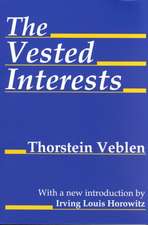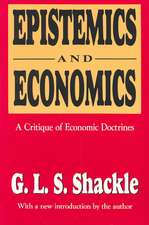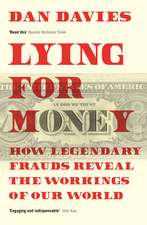The Economics of Welfare
Autor Arthur Pigouen Limba Engleză Hardback – 26 feb 2018
The Economics of Welfare established welfare economics as a field of study. The first part analyzes the relationship between the national dividend and economic and total welfare. Parts II and III link the size of the dividend to the allocation of resources in the economy and the institutional structure governing labor-market operations. Part IV explores the relationship between the national dividend and its distribution.
In her new introduction, Nahid Aslanbeigui discusses the life of Pigou and the history of The Economics of Welfare. She also discusses Pigou's theories as expressed in this volume and some of the criticisms those theories have met as well as the impact of those criticisms. The Economics of Welfare is a classic that repays careful study.
| Toate formatele și edițiile | Preț | Express |
|---|---|---|
| Paperback (1) | 342.06 lei 43-57 zile | |
| Taylor & Francis – 31 oct 2001 | 342.06 lei 43-57 zile | |
| Hardback (1) | 780.94 lei 43-57 zile | |
| Taylor & Francis – 26 feb 2018 | 780.94 lei 43-57 zile |
Preț: 780.94 lei
Preț vechi: 1112.59 lei
-30% Nou
Puncte Express: 1171
Preț estimativ în valută:
149.43€ • 156.41$ • 124.38£
149.43€ • 156.41$ • 124.38£
Carte tipărită la comandă
Livrare economică 31 martie-14 aprilie
Preluare comenzi: 021 569.72.76
Specificații
ISBN-13: 9781138535411
ISBN-10: 1138535419
Pagini: 876
Dimensiuni: 152 x 229 mm
Greutate: 1.38 kg
Ediția:1
Editura: Taylor & Francis
Colecția Routledge
Locul publicării:Oxford, United Kingdom
ISBN-10: 1138535419
Pagini: 876
Dimensiuni: 152 x 229 mm
Greutate: 1.38 kg
Ediția:1
Editura: Taylor & Francis
Colecția Routledge
Locul publicării:Oxford, United Kingdom
Cuprins
PART I WELFARE AND THE NATIONAL DIVIDEND I Welfare and Economic Welfare II Desires and Satisfaction III The National Dividend IV What is Meant by Maintenance Capital Intact V Changes in the Size of the National Dividend VI The Measurement of Changes in the Size of the National Dividend VII Economic Welfare and changes in the Size of the National Dividend VIII Economic Welfare and changes in the distribution of the National Dividend IX Reaction through the numbers of the population X The National Dividend and the quality of the people XI The method of discussion to be followed PART II The Size of the National Dividend and the Distribution of Resources of Resources Among Different Uses. I Introductory II The definition of marginal social and private net products III The values of marginal social net products and the size of the national dividend IV Rates of Return and the value of the marginal private net products V The effects of eliminating obstacles to movement VI Hinderances to equality of returns due to imperfect knowledge VII Hinderances to equality of returns due to imperfect divisibility of the units in terms of which transactions are conducted VIII Hinderances to equality of returns due to the relative variations of demand for productive resources in different occupations and places IX Divergences between marginal social net product and marginal private net product X Marginal private and social bet products in relation to industrial forms XI Increasing and decreasing supply price XII State regulation of competitive prices XIII State regulation of supplies XIV The conditions of monopolisation XV Monopolistic Competition XVI Simple Monopoly XVII Discrimination monopoly XVIII The special problem of railway rates XIX Purchasers' Association XX Intervention by public authorities XXI Public control of monopoly XXII Public operation of industries Part III I Industrial Peace II The classification of industrial differences III Voluntary arrangements for conciliation and arbitration IV Mediation V Coercive intervention V An analytical view of industrial peace VII Hours of labour VIII The methods of industrial remuneration IX The distribution of labour among occupation and places X Employment exchanges XI Unemployment versus short time XII The practicability of interference to raise wages XIII Methods of engaging labour XIV Interference to raise wages in places and occupations where they are unfair XV Fair wages inside particular industries XVI Fairness as a variable relation XVII Interference to raise wages in places and occupation where they are already fair XVIII Wage rates and capacity XIXA national minimum time-wage XX Fixed and fluctuating wage rates Part IV The Distribution of the National Dividend I The general problem of disharmony II Pareto's Law III The supply of capital and labour IV Inventions and improvements V The manipulation of wages VI Rationing VII subsides to wages Part contents/
Descriere
The Economics of Welfare occupies a privileged position in economics



















